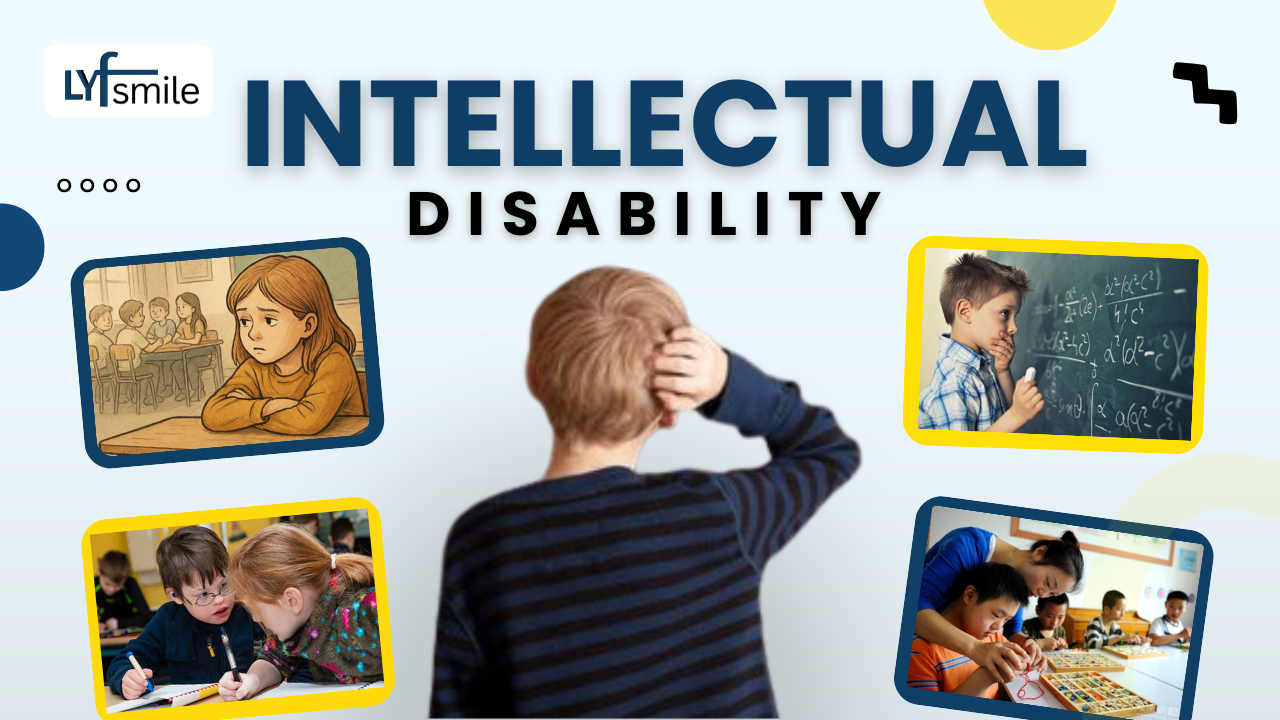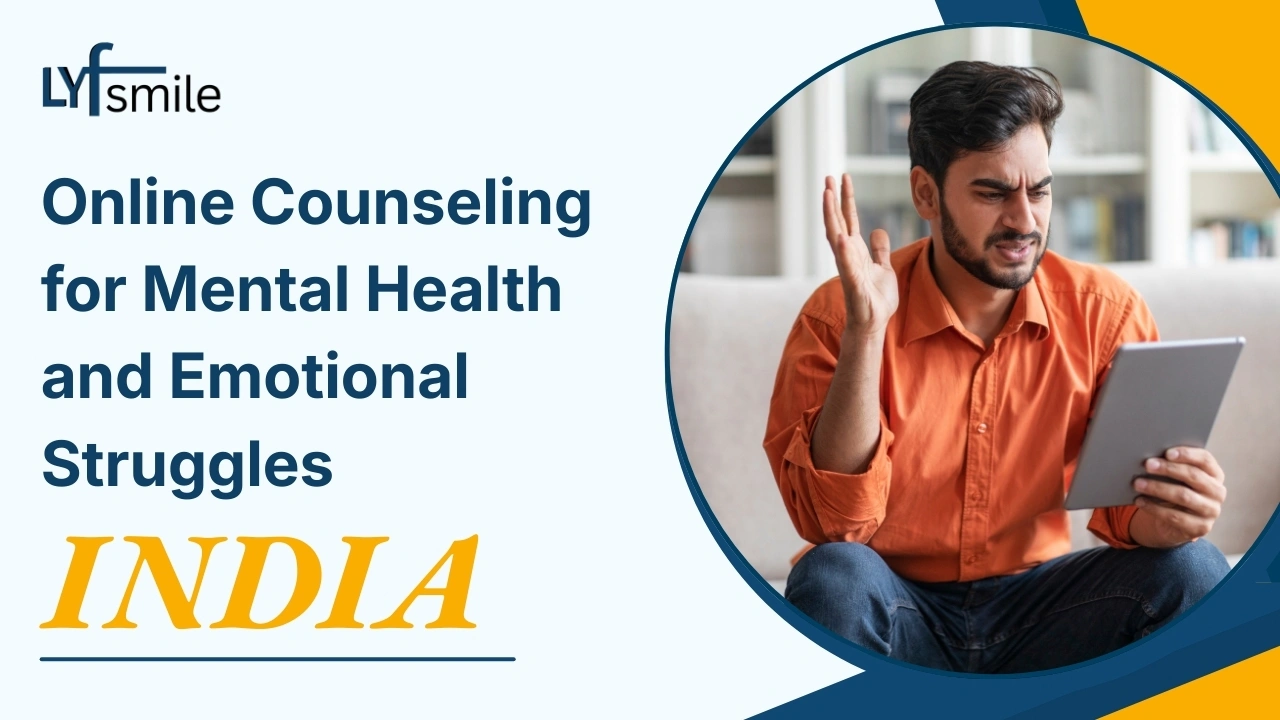
Anupam Tripathi
Intellectual Disability in Children: Causes, Symptoms & Support

Children with Intellectual Disability face many challenges in their daily life. They take more time to understand new things. Reading, writing, and basic math feel difficult for them. Daily activities like wearing clothes, eating on their own, or following instructions at school can also be hard.
They may struggle to talk clearly or make friends easily, which sometimes makes them feel sad, frustrated, or less confident. They often think they cannot do things like other children.
With the right help, these children can learn and grow very well. That is why Lyfsmile in Gurgaon and Delhi offers behavior therapy, speech therapy, and full support for parents. At Lyfsmile, every child gets care according to their unique needs, so they can improve their life skills step-by-step.
Early support helps children become more independent, confident, and happy.
What is Intellectual Disability?
Intellectual Disability is a condition where a child’s learning and thinking skills develop more slowly than other children of the same age. These children take extra time to understand new things, solve problems, and learn in school.
They may also find daily activities difficult, such as:
Getting dressed
Eating by themselves
Using the bathroom
Following instructions
They might struggle with speaking, understanding language, or making friends. This happens because the brain does not develop fully the way it should.
Intellectual Disability is not a mental illness. It is a lifelong condition, but with the right support, therapy, and love, children can learn step-by-step and live a happy and independent life.
Why Does Intellectual Disability Happen?

There is not just one reason for Intellectual Disability. It can happen due to different factors, such as:
1. Genetic Conditions
Some children are born with changes in their genes that affect brain development.
Examples include Down Syndrome and Fragile X Syndrome.
2. Problems During Pregnancy
If the mother faces certain issues during pregnancy, the baby’s brain may not grow properly:
Infections
Poor nutrition
High stress levels
Alcohol or drug use
Diabetes or high blood pressure
3. Complications During Birth
If a baby does not get enough oxygen during birth or is born too early (premature), the brain may be affected.
4. Illness or Injury in Early Childhood
Serious conditions like:
Meningitis
Encephalitis
Major head injuries
can cause brain damage.
5. Lack of Proper Nutrition
If children do not get enough essential nutrients, their brain development can slow down.
Common Early Signs in Children

Children with Intellectual Disability show some signs early in life. These signs can be different for every child, but some common ones include:
1. Learning Delay
The child learns slowly compared to other children of the same age. They may take extra time to learn numbers, letters, shapes, or simple school work.
2. Speech and Language Delay
The child starts talking late. They may struggle to make sentences, understand words, or communicate clearly.
3. Daily Activities Difficulty
Simple tasks like:
Wearing clothes
Eating independently
Brushing teeth
Using the toilet
Take longer to learn.
4. Social and Emotional Challenges
The child may find it hard to make friends or play in groups. They might get upset or frustrated easily because they cannot express themselves well.
5. Problem-Solving Difficulty
Understanding rules, remembering things, or solving small problems feels very hard for them.
How Intellectual Disability Affects Daily Life
Intellectual Disability affects a child’s everyday life in many ways. These children may need extra help in different areas:
1. Self-Care Skills
They take more time to learn:
Eating properly
Dressing up
Toilet training
Keeping things clean
They may forget steps or need reminders every day.
2. Learning in School
They face trouble in:
Reading and writing
Understanding math
Following classroom instructions
They might need special teaching or slower learning methods.
3. Communication
They may:
Speak less
Find it hard to explain their feelings
Not understand what others say quickly
Breakdowns in communication may lead to frustration.
4. Making Friends
Connecting with other children is difficult. They might not understand social rules like sharing, waiting for their turn, or playing in groups.
5. Safety Awareness
They do not easily understand danger, like:
Running on the road
Touching hot surfaces
Talking to strangers
So they need close supervision.
Levels of Intellectual Disability in Children
Intellectual Disability is not the same in every child. Some children need a little help, and some need support in almost everything. Doctors usually classify it into four levels:
1. Mild Intellectual Disability
Child can learn basic reading, writing, and math slowly.
Can do many daily tasks with a little guidance.
May need support in school work and social skills.
Most children with this level can live quite independently as adults.
2. Moderate Intellectual Disability
Learning is slower and school work is more difficult.
Needs help in daily activities like eating, dressing, or planning routines.
Can communicate simple needs and make friends with support.
Will need guidance throughout life, but can do basic jobs and activities.
3. Severe Intellectual Disability
Child learns very limited academic skills.
Needs help in most daily tasks such as hygiene, eating, and moving safely.
Communication is very limited.
They require constant support from parents or caregivers.
4. Profound Intellectual Disability
Very limited understanding and communication.
Dependent on others for almost everything.
May also have physical disabilities or medical issues.
They need full-time care and professional support.
How Parents Can Identify the Problem Early

Early identification is very important for children with Intellectual Disability. Parents are the first to notice when something feels different in their child’s growth. Some signs parents can look for include:
1. Slow Development
If the child starts sitting, walking, or talking later than other children.
2. Difficulty in Learning
Child struggles to learn basic things like numbers, alphabets, shapes, or names even after repeated teaching.
3. Poor Attention
Child cannot focus on any activity for more than a short time.
4. Communication Problems
Child uses very few words, or others cannot understand what the child is trying to say.
5. Weak Social Skills
Child avoids playing with others, does not respond to their name, or cannot follow simple instructions.
6. Frequent Frustration
Child gets irritated quickly, cries often, or behaves aggressively due to difficulty expressing feelings.
Diagnosis and Tests for Intellectual Disability
To confirm Intellectual Disability, doctors and specialists check how the child learns, thinks, and handles daily activities. The diagnosis usually includes:
1. Developmental History
Doctors ask parents about the child's early development, such as:
When the child started walking or talking
School performance
Social interaction
2. IQ Test (Intelligence Test)
These tests check the child’s thinking ability, reasoning skills, and problem-solving capacity.
If IQ is below the normal range, it can be a sign of Intellectual Disability.
3. Adaptive Skills Assessment
Special tests are done to see how well the child can do daily tasks like:
Communication
Self-care
Social skills
Safety awareness
4. Medical Tests
Doctors may do tests like:
Genetic testing
Brain scan (MRI or CT scan)
Hearing and vision check
These help find the cause of the condition.
Effective Treatments and Support Options

There is no single medicine that can cure Intellectual Disability, because it is a lifelong condition. However, with the right therapies and support, children can learn and improve in many areas of life.
Here are the most helpful treatment options:
1. Special Education
Teachers use simple methods and slow learning steps.
Children learn reading, writing, math, and daily skills at their own pace.
2. Speech Therapy
Helps children:
Speak more clearly
Improve understanding of language
Express feelings in a better way
3. Behavior Therapy
Helps manage:
Anger or frustration
Social behavior
Communication with family and friends
It builds positive behavior and confidence.
4. Occupational Therapy
Supports children in daily activities like:
Holding a pencil
Buttoning clothes
Eating properly
It improves motor skills and independence.
5. Parental Training
Parents learn how to teach and support their child at home.
This creates a strong and happy environment for learning.
How Families Can Support Children at Home
Family support plays a very big role in a child’s growth. When a child with Intellectual Disability feels safe and loved at home, they learn better and become more confident.
Here are some helpful ways for families to support their child:
1. Teach Slowly and Step-by-Step
Break tasks into small parts.
For example: First teach how to hold a spoon, then how to pick food, then how to eat.
2. Use Positive Encouragement
Always praise the child for small achievements.
A simple “Good job!” boosts their confidence a lot.
3. Practice Daily Skills
Allow the child to try:
Dressing themselves
Putting toys back
Eating on their own
Practice makes these skills stronger.
4. Create a Simple Routine
Regular schedules help the child feel safe.
Same timing for study, play, meals, and sleep works best.
5. Be Patient and Calm
Children may repeat mistakes.
Staying patient helps them learn without fear.
6. Support Social Interaction
Encourage the child to play with other children.
Teach sharing, turn-taking, and basic manners.
Role of Schools and Therapists in Child’s Growth
Schools and therapists are very important in helping children with Intellectual Disability learn and grow. They provide organized learning and professional support that children cannot always get at home.
Here is how they help:
1. Special Educators in School
Schools with special educators teach children:
Slow and simple learning methods
Basic academic skills
Social skills while playing or studying with others
They also give extra attention to each child.
2. Individual Education Plan (IEP)
Some schools make a special learning plan for every child.
This plan focuses on the child’s strengths and areas where they need more support.
3. Therapists Support Daily Life
Therapists like:
Speech therapists help with talking and understanding language
Occupational therapists improve daily living and motor skills
Behavior therapists help children learn good behavior and manage emotions
4. Group Activities
Schools and therapy centers help children join:
Group games
Art and music sessions
Social interaction activities
This improves confidence and friendships.
5. Regular Progress Tracking
Teachers and therapists share reports with parents.
This helps everyone understand how the child is improving and what more support is needed.
Why Early Intervention is Very Important
Early intervention means giving a child support and therapy at a young age, as soon as signs of Intellectual Disability are noticed. This early help makes a very big difference in the child’s future.
Here is why early intervention is so important:
1. Faster Learning
Young children learn new skills more quickly.
Starting support early helps the child improve thinking and learning skills sooner.
2. Better Communication Skills
Speech and language therapy at an early age helps the child talk better and express feelings clearly.
3. Strong Daily Life Skills
Early practice of daily activities like eating, dressing, and brushing helps the child become more independent.
4. Improved Social and Emotional Development
The child learns how to:
Make friends
Play with others
Manage anger and frustration
This builds good behavior and confidence.
5. Prevents Future Problems
If children do not get help early, they may face:
Low confidence
Behavior issues
School difficulties
Early support reduces these problems.
Best Support for Intellectual Disability in Delhi & Gurgaon | Lyfsmile

Every child deserves the chance to learn, grow, and shine in their own way. Children with Intellectual Disability may take more time to understand things, solve problems, or do daily activities, yet with the right guidance, they can make great progress.
Lyfsmile offers expert and caring support for children with Intellectual Disability in Delhi and Gurgaon, providing a safe and friendly environment for learning and emotional development. The aim is to improve communication skills, thinking ability, social behavior, and independence in daily life.
What Lyfsmile Provides:
Special Education Support
Speech and Language Therapy
Behavior Therapy
Life Skills and Daily Routine Training
Lyfsmile’s caring team creates a personalized growth plan for every child. This helps children learn step-by-step, build confidence, and stay happy while improving in school and social life.
If your child is facing slow learning or developmental challenges, early support can make a big difference in their future.
Lyfsmile is here to support your child with care, patience, and expert counseling that helps them succeed in life.
How Lyfsmile Helps Children with Intellectual Disability
Lyfsmile focuses on helping each child learn at their own speed with love and patience. The goal is to make children more confident in school, at home, and with friends.
Key Benefits of Lyfsmile’s Support:
Better Learning Skills: Children learn reading, writing, and basic math with easy methods.
Improved Communication: Speech therapy helps them express their needs and thoughts clearly.
Daily Life Skills: Training for dressing, eating, hygiene, and routine work to become more independent.
Positive Behavior Support: Reduces anger, frustration, and helps children follow rules gently.
Social Skills Development: Children learn sharing, teamwork, and making friends.
Parent Guidance: Parents are trained to support the child in everyday life.
Lyfsmile works closely with families in Delhi and Gurgaon, and through online child counseling across India, so every child gets the care they need, no matter where they live.
Support at the right time can change a child’s future. With the correct therapy, children with Intellectual Disability can learn new abilities, enjoy life, and feel proud of themselves.
FAQs on Intellectual Disability in Children
Q1. What is Intellectual Disability in children?
Intellectual Disability means a child learns and understands things slower than other children. They need extra time and support to learn daily skills and school work.
Q2. How early can it be identified?
Some signs appear in the first 2 to 3 years of life, such as late talking, late walking, or difficulty learning basic tasks.
Q3. What causes Intellectual Disability?
Causes may include genetics, birth complications, brain infections, or lack of oxygen during birth. In many cases, the exact cause is unknown.
Q4. Can children with Intellectual Disability go to school?
Yes. Many children attend regular schools with special support. Some may join special education programs based on their needs.
Q5. Can this condition improve with therapy?
Yes. With early child counseling, speech therapy, and special education, children can learn life skills and become more independent.
Q6. Can my child live a normal life in the future?
Many children grow up to work, have friends, and live happy lives with proper support and guidance.
Q7. Where can parents get help?
Parents can reach out to expert therapists. Lyfsmile provides child counseling services in Delhi and Gurgaon, along with online child counseling across India for families who cannot visit in person.
Conclusion
Children with Intellectual Disability can learn, grow, and achieve great things when they receive the right support. Every child deserves love, patience, and a chance to learn at their own pace. Early help through therapy can improve their learning skills, communication, and daily independence.
Parents should never feel alone or worried about their child’s future. With proper guidance and expert care, children can build confidence and become more active in school and social life.
Lyfsmile provides caring and professional support for families. Our team includes experienced therapists and child psychologists in Delhi and Gurgaon, offering both offline and online child counseling across India. Together, we help children move forward one step at a time with happiness and hope.
Support your child today because early help creates a brighter tomorrow. Lyfsmile is always here to guide you and your child toward a better future.








